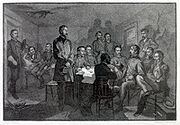
Council of war
Encyclopedia


Military science
Military science is the process of translating national defence policy to produce military capability by employing military scientists, including theorists, researchers, experimental scientists, applied scientists, designers, engineers, test technicians, and military personnel responsible for...
that describes a meeting held to decide on a course of action, usually in the midst of a battle. Under normal circumstances, decisions are made by a commanding officer, optionally communicated and coordinated by staff officers, and then implemented by subordinate officers. Councils of war are typically held when matters of great importance must be decided, consensus must be reached with subordinates, or when the commanding officer is unsure of his or her position. The classic council of war includes a discussion and then a vote, often taken without the senior commander present to influence or intimidate the subordinates. The tradition in such meetings is that the officers vote in reverse sequence of their seniority, with the junior officers voting first.
A variation on the traditional council of war is one in which the subordinates vote, but the results are considered merely advisory to the overall commander, who then makes a final decision. Such a meeting was held on July 2, 1863, during the Battle of Gettysburg
Battle of Gettysburg
The Battle of Gettysburg , was fought July 1–3, 1863, in and around the town of Gettysburg, Pennsylvania. The battle with the largest number of casualties in the American Civil War, it is often described as the war's turning point. Union Maj. Gen. George Gordon Meade's Army of the Potomac...
, in which Major General
Major General
Major general or major-general is a military rank used in many countries. It is derived from the older rank of sergeant major general. A major general is a high-ranking officer, normally subordinate to the rank of lieutenant general and senior to the ranks of brigadier and brigadier general...
George G. Meade, commanding the Union
Union Army
The Union Army was the land force that fought for the Union during the American Civil War. It was also known as the Federal Army, the U.S. Army, the Northern Army and the National Army...
Army of the Potomac
Army of the Potomac
The Army of the Potomac was the major Union Army in the Eastern Theater of the American Civil War.-History:The Army of the Potomac was created in 1861, but was then only the size of a corps . Its nucleus was called the Army of Northeastern Virginia, under Brig. Gen...
, convened his Corps
Corps
A corps is either a large formation, or an administrative grouping of troops within an armed force with a common function such as Artillery or Signals representing an arm of service...
commanders and staff to discuss whether they should withdraw from the battlefield or, if not, whether they should attack Robert E. Lee
Robert E. Lee
Robert Edward Lee was a career military officer who is best known for having commanded the Confederate Army of Northern Virginia in the American Civil War....
's Confederate
Confederate States Army
The Confederate States Army was the army of the Confederate States of America while the Confederacy existed during the American Civil War. On February 8, 1861, delegates from the seven Deep South states which had already declared their secession from the United States of America adopted the...
army or await his attack. Historical evidence indicates that Meade had already determined to stay and await Lee's attack, which occurred on July 3, the disastrous attack known as Pickett's Charge
Pickett's Charge
Pickett's Charge was an infantry assault ordered by Confederate Gen. Robert E. Lee against Maj. Gen. George G. Meade's Union positions on Cemetery Ridge on July 3, 1863, the last day of the Battle of Gettysburg during the American Civil War. Its futility was predicted by the charge's commander,...
. But Meade formed consensus in his staff and improved their confidence by encouraging a two-hour discussion and vote, which fortunately resulted in the outcome he was seeking.
In civilian usage, a council of war can describe any important meeting, such as in business, that must reach a decision under the pressure of adverse conditions.

